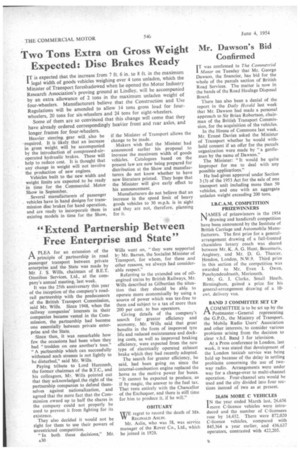"Extend Partnership Between Free Enterprise and State"
Page 32

If you've noticed an error in this article please click here to report it so we can fix it.
A PLEA for an extension of the
principle of partnership in road passenger transport between private enterprise and the State was made by Mr J, S. Wills, chairman of B.E.T. Omnibus Services, Ltd., at the company's annual meeting, last week.
It was the 25th anniversary this year of the inception of the company's roadrail partnership with the predecessors of the British Transport Commission, said Mr. Wills. Since 1948, when the railway companies' interests in their companies became vested in the Commission, the partnership had become one essentially between private enterprise and the State.
Since then, it was remarkable how few the occasions had been when they had "trodden on one another's toes." "A partnership which can successfully withstand such stresses is not lightly to be disturbed," said Mr. Wills.
Paying tribute to Lord Hurcomb, the former chairman of the B.T.C., and his colleagues, Mr. Wills pointed out that they acknowledged .the right of the partnership companies to defend themselves against nationalization, and agreed that the mere fact that the Commission owned up to half the shares in the company could not properly be used to prevent it from fighting for its existence,
They also decided it would not be right for them to use their powers of unrestricted competition.
"In both these decisions," Mr. A30 Wills went on, "they were supported by Mr. Barnes, the Socialist Minister of Transport, for whom, for these .and other reasons, we always had considerable respect."
Referring to the extended use of oilengined trains by British Railways, Mr. Wills described as Gilbertian the situation that they should be able to operate more economically by using a source of power which was tax-free to them and subject to a tax of more than 200 per cent. to bus operators, Giving details of the company's search for greater efficiency and economy, Mr. Wills said that great benefits in the form of improved tyre life and reduced maintenance and docking costs, as well as improved braking efficiency, were expected from the new type of electrically operated exhaust brake which they had recently adopted.
The search for greater efficiency, he said, had been going on since the internal-combustion engine replaced the horse as the motive power for buses. "It cannot be expected to produce, as if by magic, the answer to the fuel tax. That rests entirely with the Chancellor of the Exchequer, and there is still time for him to produce it, if he will."
OBITUARY
WE regret to record the death of MR. REGINALD Asi.mr. Mr. Aslin, who was 58, was service manager of the Rover Co., Ltd., which he joined in 1920.












































































































